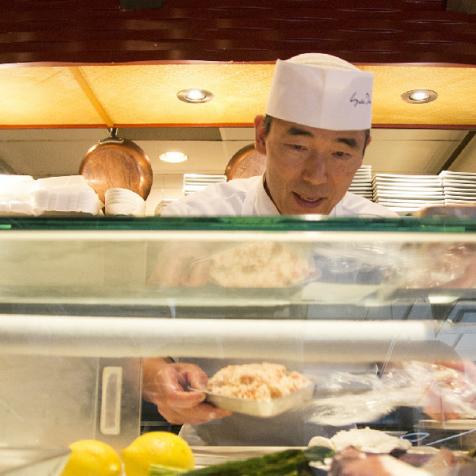
Company Details
Location
Denver
Founded
1984
Ownership Type
Private
Employees
160
Products
Restaurant
Sushi Den and Izakaya Den
Den Corner Restaurants
Founded: Christmas Eve, 1984
Privately Owned
Employees: 160
The Kizaki brother’s landmark Denver operation is equal parts manufacturing and art. The experience is transcendent.
When you say Sushi Den to anyone paying attention to the food scene in Denver what immediately comes to mind is the gold standard for sushi, and Japanese cuisine in general, in the state, and perhaps anywhere else outside of Japan itself. That excellence is no accident. Owner Toshi Kizaki, along with his brothers Yasu, the restaurant’s director of operation in Denver, and Koichi, a fish buyer back in their home Prefecture in southern Japan, go to great lengths to insure that every ingredient in the “simple food” that is sushi is “precise.”
Every restaurant to some extent is a manufacturing operation; they take in raw materials, add value, and then sell a created product to, hopefully, a dedicated customer base. At Sushi Den, however, it is a production worthy of veneration.
Fish, of course, is at the heart of the operation, but getting the right fish to the consumer is a production, indeed. Yoshi visits a fresh fish market distribution center in Commerce City, called True World Foods, every early morning, six days a week, and personally selects only the best fish flown in fresh from such locales as Scotland, New Zealand, Spain, the Marshall Islands, South Africa, Mexico, Australia, Alaska and Canada. In addition, he works with his brother Koichi back in Japan – the two talk almost every day – who selects the finest fish from Japanese waters in southern Japan, and then ships them twice a week on Korean Air via San Francisco to Denver. Toshi himself goes to Japan about four times a year – each season – to see personally what is available.
“We get the fish from the southern part of Japan, the Asia/Korean side, (which is) different from Pacific side – local fish from where we grew up,” says Kizaki. “Thirty percent of our fish is from Japan.”

And, of course, it’s a lot of fish: Sushi Den and its sister operation, Izakaya Den, go through 1,500 to 2,000 pounds of fresh fish per week. It is cut and sliced for preparation by some 30 sushi chefs under the direct supervision of Toshi, and it is an exacting mix of skill and art that takes years to learn and prefect. That ends up being one of Sushi Den’s major challenges.
“In Sushi Den (sushi chefs) advance quickly because they have more opportunity to slice fish,” says Toshi. “They open up their own place; maybe 5 or 6 or 7 places have opened up from Sushi Den apprentices and chefs (who) advanced their skills here. They don’t have brothers in Japan so we are more advanced.”
So, of course, to keep the production going with the quality Toshi demands requires getting the best fish worldwide and then having the highly skilled workers who can prepare it properly to exacting standards. But such care also goes into other parts of the operation.
Sushi is most often served with rice and Toshi can expound for hours on how the rice has to be just right; the perfect texture, not too soft and not too hard. Trouble is, at Denver’s altitude that proved to be a daunting task, so Toshi years ago developed his own high-pressure rice cooker to accommodate the altitude and create the kind of rice that meets his standards.
Also, to control the quality and freshness of vegetables – often vegetables that are native to Japan and quite exotic here – Sushi Denver in 2010 purchased a 6.5-acre farm near Brighton to grow its own pesticide-free vegetables for use in its kitchens. The year-round supply of such food stuffs was bolstered when, last year, Sushi Denver completed a 3,000 square-foot passive solar greenhouse on its farm that extends the growing season. They grow Japanese produce including: Ao-Shiso, Aka-Shiso, Thai Chili, Shishito Pepper, Komatsuna, Mitsuba, Mung Bean and Kabocha. In addition, micro-greens, herbs, citrus trees and orchids are also being grown.
Another key issue this manufacturer has to contend with is the American palate.
“It’s a different culture,” says Kizaki. “The way I learn in Japan sometimes doesn’t work here; for instance squid. Salted squid guts doesn’t go well with American diners. American diners aren’t fond of chewy stuff – octopus is not so popular; in Japan very popular.
“American diners have a different flavor profile,” he adds. “Thirty years ago when we slice up tuna we served with wasabi, but we had to make a special sauce (that is) much more approachable for the American diner.”
Obviously, the Kizakis have made Sushi Den, with its 220 seats, and Izakaya Den, with its 250 seats, very approachable, as the crowds waiting to get in on nearly a daily basis exemplifies.
“We have a system in place,” says Toshi. “It took us 30 years to get to this point, a huge data base of customers; what day they come. We know this day will be busy, this day slow. When Broncos play – slow.”
That’s just about par for the course: perfection in fish, precision in rice and vegetables, and every detail right down to consumer tastes and habits. No wonder that Sushi Den is the gold standard.
Challenges: Managing the supply chain. “Five years ago new fish was shifting and changing; with (global) warming different fish are showing up.”
Opportunities: The American palate. “How do we introduce the unknown new fish ideas to the American public.”
Needs: “We can get the fish – but the chefs, that is the harder part. We need more highly skilled chefs; there are not too many.”

